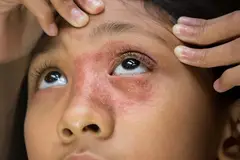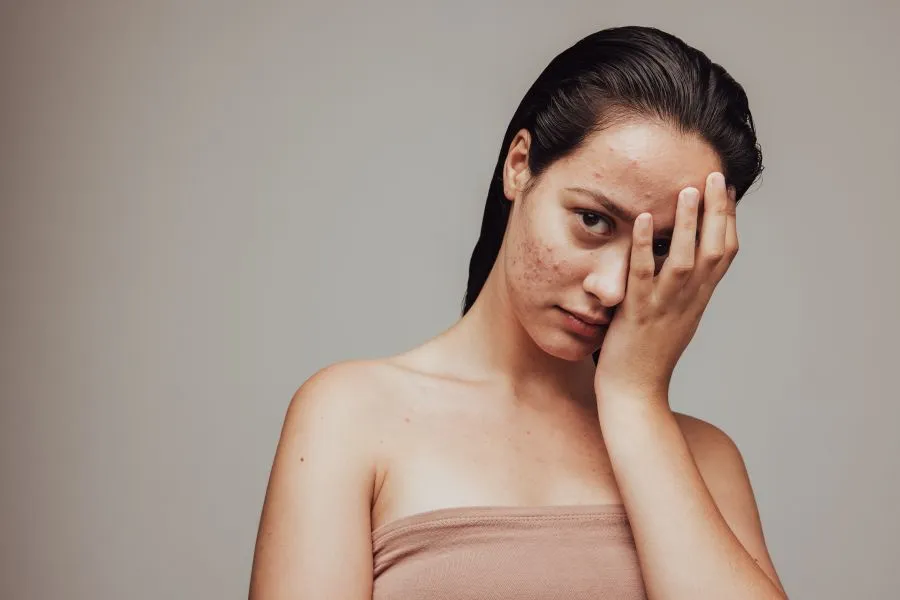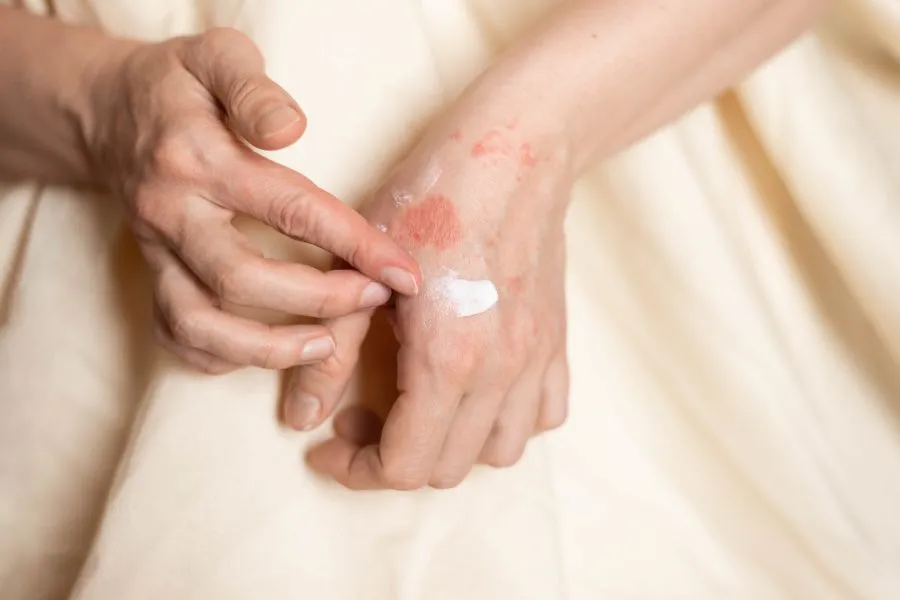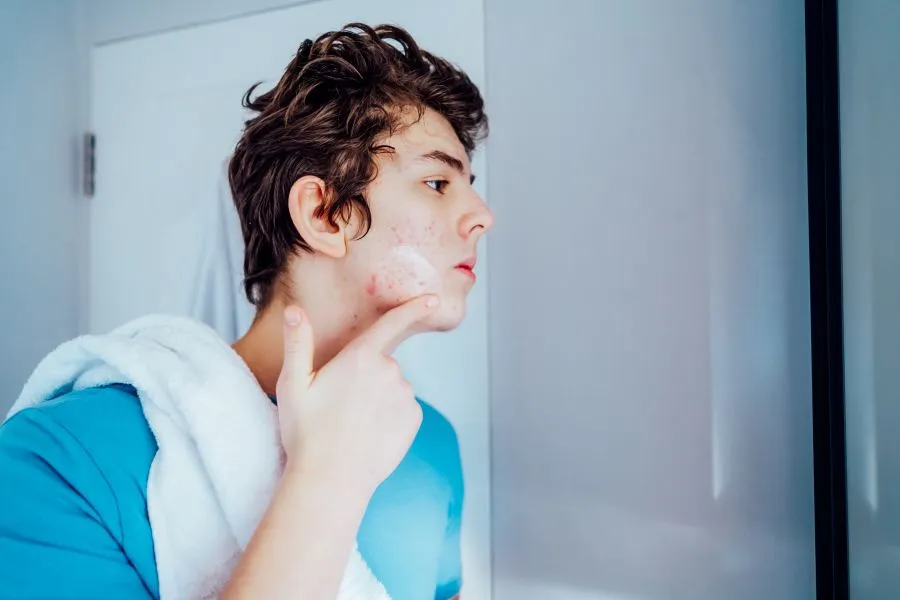Social stigmatization of skin conditions: La Roche-Posay reveals mental toll of eczema and scars
Key takeaways
- La Roche-Posay’s study reveals that skin conditions like eczema and scarring have a large psychological impact.
- Social stigmatization and mental health challenges, including low self-esteem and exclusion, are common among those with skin conditions.
- La Roche-Posay is using research and technologies to address the physical and emotional toll of skin issues.

La Roche-Posay has found that scarring and eczema take a “profound” psychological toll on people. Respondents to the Scars of Life Epidemiological Study reported diminished self-esteem, social stigmatization, and limited personal and social life choices.
The dermocosmetic brand surveyed 30,000 adults across 27 countries to investigate how scars and skin conditions are “not just a dermatological issue,” but also a mental health one. Half the world’s population bears at least one scar — a mark left by injury, skin disease, cancer treatment side effects, or sun exposure.
La Roche-Posay reveals that scars significantly impact daily life, sometimes even for a lifetime. Seventy-one percent of acne patients express lower self-confidence, and 47% of eczema sufferers in childhood and adulthood prefer to hide themselves.

Half of the participants reported being bullied, 36% felt excluded, and 43% struggled with negative self-image. Eczema was shown to impact 40% of respondents’ love lives or sexuality.
Earlier this year, the WHO recognized skin health as a global health priority, urging action on physical conditions and the stigma, anxiety, and distress they cause. The Scars of Life Epidemiological Study found that 50% of cancer patients interrupt treatment due to skin-related side effects.
Alongside the study, La Roche-Posay launched its first long-form documentary: Scars of Life. The video explores the emotional and physical impact of scars, from acne to cancer, and other skin conditions.
 Self-confidence can drop as skin conditions affect social lives. La Roche-Posay is using 3D bioprinters to alleviate some of the mental toll scars and other skin conditions take. The technology makes skin from a mix of cells and nutrients so the cells can live, multiply, and become functioning skin. The brand envisions that in the future, it will aid in a deeper understanding of aging and the impacts of climate change and enable earlier, safer diagnosis of skin conditions.
Self-confidence can drop as skin conditions affect social lives. La Roche-Posay is using 3D bioprinters to alleviate some of the mental toll scars and other skin conditions take. The technology makes skin from a mix of cells and nutrients so the cells can live, multiply, and become functioning skin. The brand envisions that in the future, it will aid in a deeper understanding of aging and the impacts of climate change and enable earlier, safer diagnosis of skin conditions.
Personal Care Insights speaks to Dr. Delphine Kerob, international scientific director of La Roche-Posay Laboratoires, about the psychosocial impact of skin conditions and beauty brands’ role in reducing their stigma and effect on consumers.
How do you see the growing intersection of dermatology and mental health influencing the personal care and dermatology industries?
Kerob: Skin diseases encompass a wide range of conditions from infectious diseases to inflammatory skin disorders, genetic dermatoses, skin cancers, environmental diseases, skin side effects of cancer treatment, etc. They can cause not only physical marks but also social and emotional effects, sometimes leading to stigma, discrimination, and related mental health issues.
We’re seeing more studies explore how skin disorders affect not just quality of life but also deeper issues like social stigmatization.
Working with pharmaceutical company Eli Lilly, we have developed and validated a new stigmatization scale: the PUSH-D questionnaire. This is a published study exploring the impact of several conditions, such as pigmentation disorders, atopic dermatitis, acne, and hidradenitis suppurativa, on social stigmatization.
We have also more recently worked with international experts and patients to develop a new scale to assess the long-term impact of skin diseases on life trajectories: the Dermatology Long-Term Life Impact Measure (DLLIM) scale, published this year. We are using it in our “Scars of Life” program.
How can the personal care industry play a larger role in reducing the stigma around visible scars and skin conditions?
Kerob: The first step to help people suffering from skin conditions is to understand the pathophysiology of skin issues (ex. skin barrier, inflammation, DNA damage, microbiome, and neurosciences), then understand clinical presentations. It is just as important to understand how these skin issues affect people emotionally and socially, not just medically. Raising awareness on the deep impact of skin issues beyond clinical signs is a way to give back the voice to the patients and help them speak up — this is an important step, as we all know. Half of cancer patients interrupt treatment due to skin side effects.
Half of cancer patients interrupt treatment due to skin side effects.
With this knowledge, we develop skin care solutions with experts from our research teams and international experts from the scientific community. We then run high-standard clinical studies, including randomized controlled studies and real-world evidence research. These help us see how our products work as monotherapy for milder forms of the condition or for maintenance. We also test them as add-on treatments to topical and/or systemic drugs, either to enhance their effects and improve outcomes, or to mitigate their side effects.
Another important factor is treatment adherence, especially in some conditions such as acne. Here, we have developed a new tool with our digital team and experts to not only assess acne severity, but also improve acne knowledge and treatment adherence through a coaching program.
Additionally, we work hard to prevent skin conditions such as skin cancers, pigmentation disorders, and sun allergies by raising awareness of the short and long-term risks of sun exposure and recommending the best ways to protect the only skin we all have.
What gaps exist in personal care brands catering to skin health and psychological well-being?
Kerob: It’s very interesting to see that the psychological burden of skin diseases is not necessarily linked with their severity. We therefore cannot assume that only patients with severe conditions will experience mental health comorbidities. This is why we need to address the psychological well-being of any person with a skin condition.
La Roche-Posay has always been a brand committed to developing solutions that change the lives of the two billion people suffering with skin issues. We understand that skin is not just an outer layer — it’s a matter of life itself.
How has awareness grown surrounding the impact of skin conditions on mental health?
Kerob: The deep impact of skin conditions on mental health has been described for many years, with a strong link between skin and the brain, where skin can lead to brain issues and brain issues can trigger or worsen skin issues. This is fascinating as skin and the brain come from the same embryonic tissue.
 Stigmatization is a hidden consequence of living with eczema and scarring. However, what was less known and studied was the social stigmatization of skin issues, for which we have raised awareness since our publications of the new PUSH-D scale and different studies, including the scale. Now, what we are starting to understand, first with atopic dermatitis, is the long-term impact of the condition on a person’s educational and professional life, personal and social life, daily habits, and self-confidence.
Stigmatization is a hidden consequence of living with eczema and scarring. However, what was less known and studied was the social stigmatization of skin issues, for which we have raised awareness since our publications of the new PUSH-D scale and different studies, including the scale. Now, what we are starting to understand, first with atopic dermatitis, is the long-term impact of the condition on a person’s educational and professional life, personal and social life, daily habits, and self-confidence.
What is La Roche-Posay’s main reason for bringing this research to light?
Kerob: We are deeply committed to improving dermatology patients’ lives, and for this, we need to listen to and understand them and raise the bar when developing solutions. This is a brand mission, but it is also what drives the people who work for the brand, with full support from the whole team.
We are going to continue our research program, keep sharing our findings, and help patients around the world speak up. We will keep running studies and supporting independent research globally, driven by our passion for dermatology and our mission to help those living with skin conditions.













